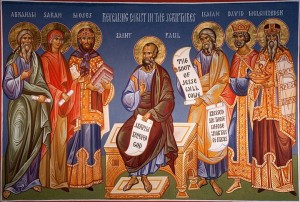19 November OS 2015 – Wednesday of the 27th Week after Pentecost/9th Week of St. Luke, Holy Prophet Abdia (Obadiah), Holy Martyr Barlaam, Righteous Barlaam and Josaphat
Throughout the coming weeks, we will be fasting and increasing our vigilance in prayer and divine services in order to prepare for the Great Feast of the Nativity of the Lord. The Church in Her wisdom has placed the feast days of several of the prophets during the Nativity Fast – such as the Prophet Obadiah, whom we remember today – in order to call our attention to their prophetic words foretelling the coming of God in the Flesh to save the human race from eternal death.
What is a prophet? Today, there is a lot of “buzz” – whether emanating from conspiracy websites, occult/New Age authors, pop “evangelical Christian” circles, the Roman Catholic groups promoting various “apparitions,” or the newly appeared and cleverly marketed false elders of “World Orthodoxy” – about prophecies concerning future events, but we know that we should not be curious about all that and cannot trust it – it is a bizarre hall of mirrors, a world of delusion. In the true Church, there have always been real prophets, and it is to them we should turn for the explanation of the Holy Scriptures and their message regarding the beginning of the world, the present, and the end.
In the Old Testament Church, that is, the congregation of the true worshippers of God from Adam and Eve until the coming of Christ, the prophets – like Moses, Elias, Isaias, Jeremias, and Daniel – were holy men, not just religious people who were curious about the future and “figured it out.” Because of their pure and blameless life, and because God chose them as His spokesmen, they saw in mystical visions the Truth about the beginning of the world, the present state of God’s people, and things to come.
St. Gregory the Dialogist [Gregory the Great, Pope of Rome] (c. 540-604), distinguishes for us the various modes of prophecy: “Prophecy has three tenses: the past, the present, and the future…We shall speak more truly of the three tenses of prophecy if we quote the evidence of Holy Scripture. Prophecy concerning the future: ‘Behold, the Virgin shall conceive in the womb, and shall bring forth a Son (Isaiah 7:14).’ Prophecy concerning the past: ‘In the beginning, God made the heaven and the earth (Genesis 1:1).’ For a man [Moses] speaks of a time when man was not [the beginning of the world]. A prophecy about the present is when Paul the Apostle says ‘But if all keep on prophesying, and some unbeliever or unlearned should come in, he is reproved by all, he is examined by all. And thus are the secrets of his heart become manifest; and so falling upon his face, he will make obeisance to God, reporting that God is verily among you (I Corinthians 13:24, 25).’ Indeed, when it is said, ‘the secrets of his heart are made manifest,’ it is truly shown that through this mode of prophecy the Spirit does not predict what the future will be, but reveals what is. How then may it be called the spirit of prophecy which lays bare no future event but reports the present? In this case, attention must be paid to what is rightly described as prophecy, not because it predicts future events, but because it uncovers hidden truths.” – from The Homilies of St. Gregory the Great on the Book of the Prophet Ezekiel (Center for Traditionalist Orthodox Studies), quoted in The Lives of the Holy Prophets (Holy Apostles’ Convent).
Prophecy, then, is not simply predicting the future. It is the speaking of a true word directly sent from the Lord into the pure heart of a saint, whether concerning the past, the present, or the future, for the salvation of souls.
In the New Testament Church, the holy prophets are the ascetical and God-bearing Fathers who accurately interpret the Scriptures, as well as the monastic elders and spiritual fathers who give accurate, Scripturally true, and ecclesiastically traditional advice to their spiritual children based on a pure-hearted understanding of the spiritual state, the sins, and the needs of the person in front of them. They, too, are prophets, because their hearts are pure and they are strictly adhering to obedience to the Word of God. They do not seek visions or knowledge, but only purification from sin, illumination, and holiness. God gives them knowledge of things past, present, and to come – to the extent needed by the Church in their time – as a by-product of repentance and holiness.
How different are the self-appointed prophets who tickle the ears of the curious! They may occasionally give accurate “prophecies,” because they are helped by demons, who are extremely intelligent and can to some extent figure out what is going to happen next. But the “truth” of these “prophecies” is always mixed with the poison of untruth. This poisonous “truth,” however, is entertaining and addicting, while God’s truth is plain, uplifting, and straight talk, and calls for our repentance, obedience to the Church’s tradition, and moral regeneration. This is why most people would rather get their “prophecy” from Nostradamus or the “Left Behind” series or false elders rather than from the true Church. Let us not be like them, but return to the pure fountains of Truth during this Fast: our daily prayers, the reading of Holy Scripture and accessible patristic commentaries, reliable and traditional books about the ABC’s of spiritual life, and the Lives of the Saints. If we keep the Faith and strive for repentance, the Lord will give us the discernment we need to read the signs of the times and to prepare for those future realities we do know about without any new prophetic revelation: death, God’s judgment, Heaven, and Hell.

